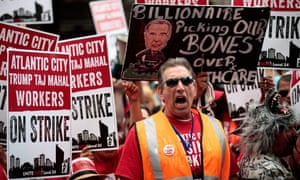Donald Trump
Trump and Atlantic City: the lessons behind the demise of his casino empire
In 1990, Donald Trump threw a star-studded opening party at the $1.1bn Taj Mahal. Today, as it is about to be shut down, locals accuse him of ‘sucking the life and the money’ from the casino and leaving the city to deal with the fallout
Rupert Neate in Atlantic City
Friday 2 September 2016
The night of 2 April 1990 is one Tina Condos will never forget. It was the opening night of Donald Trump’s new $1.1bn Atlantic City casino, and Condos was working as a cocktail waitress serving drinks to Michael Jackson, Elle Macpherson and the other stars and socialites who had flown in for the big night.
Lit by $16m worth of chandeliers, Trump described the casino, then the most expensive ever built, as the “eighth wonder of the world”. The property tycoon now turned presidential candidate also promised it would transform the fortunes of the New Jersey coastal city.
His promise held true, for a brief period, but now his casino empire is a busted flush: the Taj is set to close, and Atlantic City teeters on the edge of bankruptcy. The impact of the Taj’s closure will be worse for the city than Hurricane Sandy, the 2012 storm that all but washed away Atlantic City’s tourism business, says its mayor. For a man who is running in large part on his business record and a promise to Make America Great Again, Trump’s foray into Atlantic City tells a cautionary tale.
‘It was really, really awesome’
“Trump was like the second coming of Atlantic City,” Condos, 54, said near the nine carved marble elephants that line the entrance to the 42-storey Trump Taj Mahal casino and hotel. “This was going to be the great place to work. We were going to make a lot of money, we were going to have benefits, healthcare, we were going to be able to raise our children. It was going to be awesome.
“And, you know what? It was. It was really, really awesome. I loved working for Trump back in the day.”
Trump soon became the biggest employer in town, running three casinos, and the city was, as the Republican candidate put it recently, “a very good cash cow”. But Trump, 70, has gone.
After stripping hundreds of millions of dollars in assets from his casinos in successive bankruptcies, all that’s left of Trump’s legacy here is the forlorn and empty Trump Plaza and the down-at-heel Taj, which is set to close its doors permanently on 10 October.
Trump has scrubbed his name from the boarded-up Plaza, but it still shines brightly above the elephants at the entrance to the Taj at the eastern end of the boardwalk. He has no stake left in the casino, which was bought out of bankruptcy by his friend the billionaire investor Carl Icahn, who has been mentioned as a possible treasury secretary should Trump secure the White House in November’s election.
As part of the bankruptcy deal, the Taj workers were stripped of their healthcare, pensions, meal breaks and other benefits. Icahn had offered to restore benefits but not close to the level of other casinos. About 1,000 low-paid staff, including cleaners, cooks and waiting staff, including Condos, walked out on strike on 1 July. The casino is still operating, as dealers and security staff are not involved in the dispute.
Icahn, who is worth $16.5bn according to Forbes, responded to the all-day-and-all-night strike – the longest in Atlantic City casino history – by announcing the closure of the Taj and blaming the strikers for blocking its “path to profitability”.
Bob McDevitt, president of the casino workers union Unite Here Local 54, said it was Icahn and Trump, not the workers, who plunged the Taj into crisis by sucking money out of the city during the good times and not investing in the future as Atlantic City faced intense competition from new casinos opening up across the north-east.
“Trump made a lot of money off of it [the Taj and its bankruptcies],” McDevitt said. “He rifled through the Taj Mahal at the last bankruptcy in 2009, he basically took all the money and left.
“He basically sucked the life and the money and the fortune out of this property – it’s a dried-up husk and the workers are left to deal with it [as] he goes on his merry way and goes on to run for president.”
Atlantic City: a lesson about President Trump?
Trump hasn’t been shy about the money he has made in the city. “I made a lot of money in Atlantic City and left 7 years ago, great timing (as all know),” he said on Twitter last month.
McDevitt said Trump’s name on the door of the Taj is a tacit approval of Icahn’s negotiation tactics, and warned that it could be a harbinger of things to come in an America run by a President Trump. “His name has been on it for the entire 23 months that these workers have been put on the rack by Carl Icahn. If my name was on the casino after 23 months of torturing the workforce, I would demand it be taken off the property.”
McDevitt, who was born and bred in Atlantic City, said: “If you want to know what the country is going to look like two years into a Trump administration with Carl Icahn as treasury secretary, you don’t have to look any further than Atlantic City and the Taj Mahal. The future is workers working for a wage; no benefits, no healthcare, no future, no meaningful jobs.”
The imminent closure of the Taj, which would take the number of recently shuttered casinos to five, is more traumatic than Hurricane Sandy and “the biggest crisis to face the city”, said Atlantic City’s mayor, Don Guardian.
More than 8,000 jobs have been lost and nearly 3,000 more will go when the Taj closes, a devastating loss in this already struggling city. Within the past five years the city’s tax revenues have fallen by 70%, and Guardian is having to make severe cuts to the city’s budgets and employees’ pay to avoid a state takeover, just as Michigan did ahead of Detroit’s historic bankruptcy in 2013.
Guardian, an openly gay Republican with liberal values, said Trump did wonders for Atlantic City at the height of the casino boom and provided “a ton of jobs”, but then pulled out when things started to get tough.
“When ‘The Donald’ was here – you can talk to union representatives – this was a pretty fair guy,” Guardian, 63, said. “It was the workers that really made him. All those Mexican American workers in Atlantic City that cleaned the rooms, that made the beds, that scrubbed the toilets, that cooked the food, they all worked very hard, got paid a reasonably good working salary and they made him and his companies very successful.
“But what happened since? He didn’t invest. He took the money and went elsewhere.”
Guardian, who was elected in 2013 despite 87% of city voting Democrat in the 2012 presidential election, said he welcomed the interest of billionaires like Trump and Icahn in the city and understood that the casinos’ owners wouldn’t pay high wage to cleaners and cooks, but added that they should be given basic benefits.
“We are a ‘Sin City’ business,” he said. “The big guys can come in here, buy a building, start a business. [I tell them] ‘I want you to make boat-fulls of money’, but it can’t be on the backs of the poor people that make you successful. A living wage that includes health benefits has to be the minimum, and if you can’t provide that maybe you shouldn’t be in business to begin with.”
Guardian said while Trump “ran it real well” when he was active in the city’s casinos, when times got tough “he bailed on Atlantic City and left people in the lurch”.
Condos, the Taj cocktail waitress, is one of them. She recently lost her home in a foreclosure and is struggling to provide for her four children. “I’ve got to be honest with you, I loved working for Trump back in the day and I like some of the things he stands for,” she said as she drove the Guardian from the picket line to her boarded-up former home. “But we have been left with nothing.
“We went in every day, worked hard, made them money; they profited from the labour and they should do the right thing now and give us our pension and our benefits. We don’t want anything extra, we just want a fair contract.”
She continued: “We have a job that no one else wants. We wait on people. We work weekends, holidays. We make beds, we’re waitress, bartenders, bar porters. No one wants these jobs, but they were jobs that afford me to raise my four children and never miss a game.”


No comments:
Post a Comment